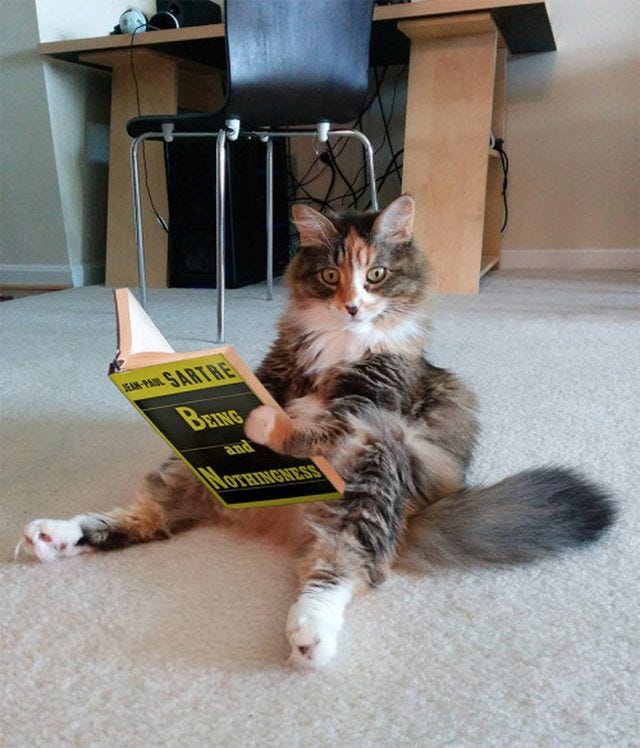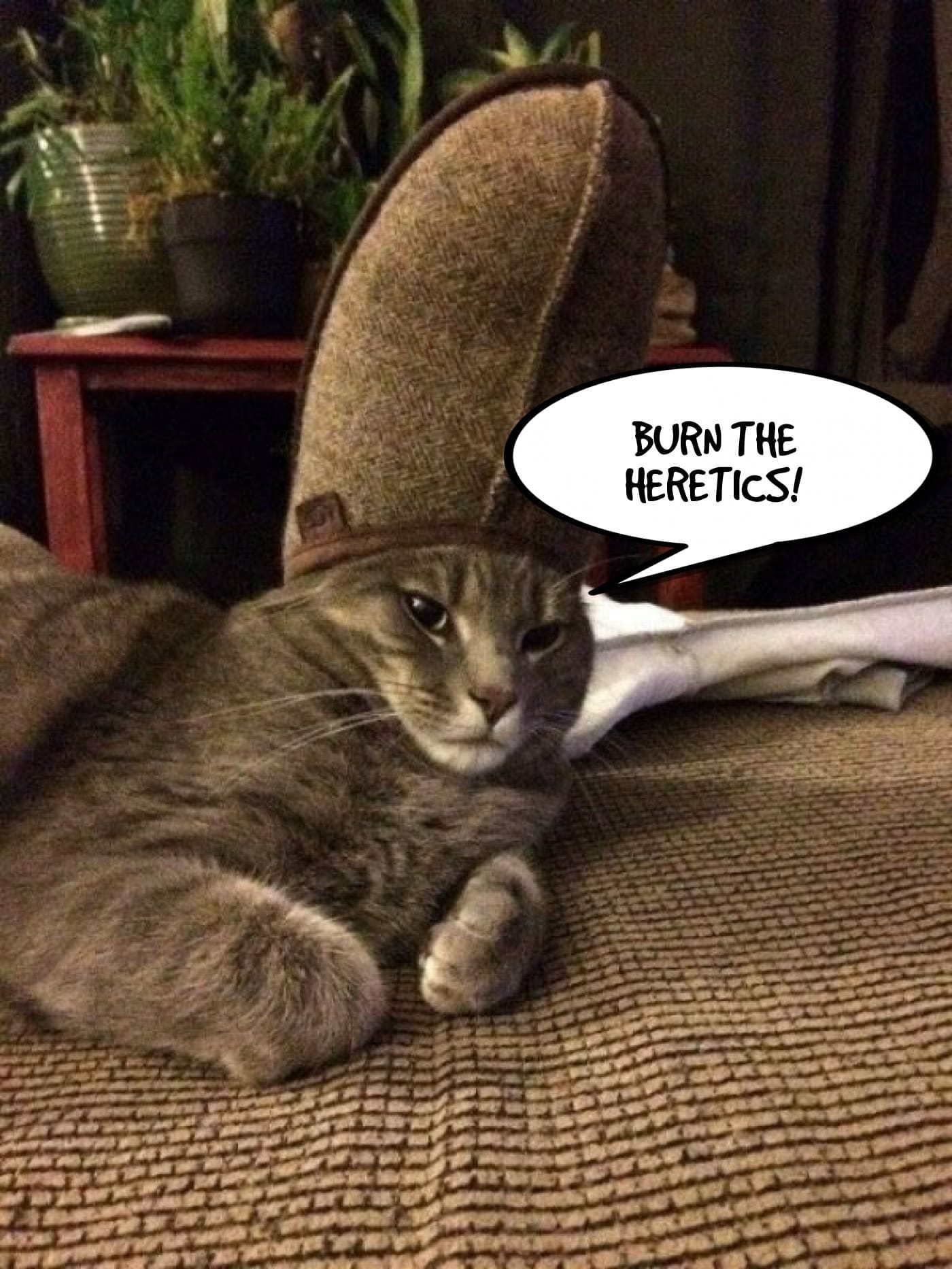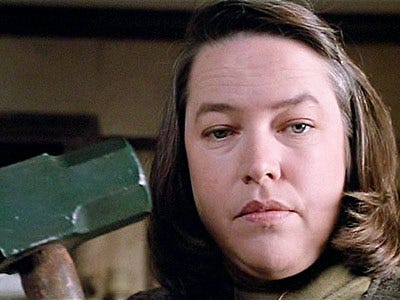looking for happiness in all the wrong places
and how to re-internalize and revitalize the american dream
i was struck by some of the ringing truths in this arthur brooks missive in the atlantic.
but in the end, it seemed to me to get a significant piece wrong and therefore carry into some perilous precincts.
being a helpful gato, i’d like to propose some alteration to the assumptions marring the conclusions of an otherwise excellent work.
there, that’s better.
let’s explore.
there is a really strong start here. this is great stuff, insightful, and bang on:
Happiness is a core part of the American dream. As the second paragraph of the Declaration of Independence reminds us, the pursuit of happiness is one of our unalienable rights, alongside life and liberty. Asked later why he included it, Thomas Jefferson said it was simply “an expression of the American mind.”
How radical—and how peculiarly American. At the time, happiness would have been considered presumptuous for anyone to pursue, let alone the nobodies populating this start-up nation. But that is who our ancestors were—ambitious riffraff living start-up lives, pursuing their happiness as they saw fit.
And still today, the pursuit of happiness is what leaders must promote and protect. Their job is not to make us happy—no government can or should try to do that—but to protect our ability to pursue our happiness freely.
i mean, if he had stopped right there, what could one do save applaud?
and this is similarly apt:
You don’t need these data, though, to know there is a problem. It’s in the air. Practically everyone I meet will say they have a feeling that we are losing something as a country—something beautiful, unique, and valuable. No matter how one feels about politics or the election last week, very few can shake this feeling.
and this is doubtless so. the malaise of cultural disintegration and polarization is upon us, pervades us, and holds us down, an invisible hand of alienation always choking off the breath of america and the american dream.
this debased and degraded condition of mutual hatred and negative sum malignancy is the inevitable end result of the conjunction of coercive collectivist impulse and grievance culture that has mistaken the profession of oppression for status and virtue. it replaces the noble and satisfyingly acts of striving to do and to be more with the endlessly aversive state of ascribing ones own failures and failure to strive to the oppression of others and demanding redress.
the true damage of such a degenerate values system is second order: it destroys the satisfaction of achievement.
no longer can the long hard climb successfully navigated and the grand vistas from mountaintops ascended bring joy because such joy comes from accomplishment and simply shrieking until you get given that which you have not earned can never elicit such sentiments as pride or attainment.
worse, the presence of such pollutes even those who DO succeed as ever must they wonder if indeed they did this alone or if they were aided by preference and privilege be it intrinsic or affirmative action in origin. perhaps worst, even if they were not so advantaged, they will be hounded and hectored as if they had been and forced into struggle sessions to apologize for their virtues.
and this is the road to “everyone is miserable.”
and this is why so much of the rest of arthur’s piece which begins with such promise veers into dissolute and perhaps dangerous waters.
As a social scientist, I believe that happiness should be understood as a combination of three phenomena: enjoyment, satisfaction, and meaning. Enjoyment is pleasure consciously and purposefully experienced, so it can create a positive memory. Satisfaction is the joy of an achievement, the reward for a job well done.
And then, there’s meaning. You can make do without enjoyment for a while, and even without a lot of satisfaction. But without meaning, you will be utterly lost. That is the psychiatrist and Holocaust survivor Viktor Frankl’s argument in his classic book Man’s Search for Meaning. Without a sense of meaning—a sense of the why of our existence–our lives cannot be endured.
this is juggling nitroglycerine.
“meaning” in life is a very tricky thing to handle. there is no obvious, inherent reason that we require it. it’s not like food or air. it’s ephemera. it’s also the passkey to human manipulation.
there has always seemed to me to be a sort of slot in the human mind that says “place concept bigger than me to believe in here.”
we can argue about the origin of this in notions of the soul, greater consciousness, or the evolutionary biology of losing nearly all the biodiversity of the Y chromosome as humans settled down for agriculture and the truly independent “non-joiner” hunter gatherers learned hard lessons about facing armies of folks whose genes did incline them to do what the guy with the white beard said. (effectively a species domesticating itself)
but its existence, at least in the metaphorical sense and quite likely the genomic one, remains pretty unequivocal.
you can fill this slot with lots of things: religion, family, ideology, work, social groups, but whatever the payload most humans seem desperate to ensure that this space is occupied and active. they are often unhappy and vulnerable to the next cult that comes along if it is not.
and what you fill it with determines a great deal about you.
this is why so many ideologies seek to disparage and rip out that which was there, occupy it, and defend it.
communism wants to destroy religion and family
religion wants to keep out other religions (there is no god but our god)
family can easily crowd out religion so many religions do not allow priests to have one.
woke literally hates everything but itself and attacks it viciously using deconstructionist parlor tricks that it refuses to allow to be used upon its own core salients.
many ideologies like green disparage both religion and child rearing.
you get some blends of function and convenience (pro-family religion, pro-collectivist/socialist green ideology) but all wage war against all.
it’s a sort of darwinian competition to occupy this “bigger than me” slot that seems associated with meaning and the part i really buck against here is the idea that it must be filled with something external or answer some questions that i feel to be fool’s errands.
brooks tries to boil it down to the interrogatives below, but i think this is dangerously inverted and that using such a framing functionally turns the human experience inside out. (i also think this sort of framing is VERY common and leads to many of our issues)
Here is a quick diagnostic tool I sometimes use to find out if someone has a good sense of their life’s meaning. I ask them two questions:
Why do you exist?
For what would you be willing to die?
“why do you exist?” is the philosophical divide by zero error of the ages. everyone grapples with it, no one can answer it, it makes the machine graunch, and in the end you just pick something to believe because you need to make the question go away.
but why? why is this a centerpiece question? why do you have to care? why can you not invert this entire chain of presumption into something that is not such an enduring source of dissonance?
true story: today i was walking on the beach. there was a woman with a dog. they had lost the dog’s ball in the surf and could not find it. i happened to see it, picked it up, and said “hey dog!” and tossed it back to him. he clomped happily, she smiled thanks, and we all went about our day. this simple act made me happy. the dog was happy. the woman was happy. and off we go.
why?
who cares?
you need to be a special kind of fool (or worse, a philosopher) to pick this apart and pixelate it until it no longer brings joy. it does not need to be understood.
it just is.
i exist. what would bring me enjoyment? what would bring me satisfaction? what can i achieve and what can i be?
if you need someone else to tell you this, you’re walking out on some very thin ice.
perhaps the very act of demanding meaning in the grand cosmic joke is that which we must overcome in order to be truly deemed autonomous and sovereign and that only from those foundations can we build lives of true personal meaning.
therein, i suspect, lies the real rub.
you can fill this slot with yourself. you just need to know that it’s there and make the choice.
this is not some solipsistic ego trip, it’s just basic self-actualization.
personal meaning is distinct from “meaning” because it cannot come from outside. it is an internal process and must be constructed and carried there. anything else renders you a subject, not a citizen. you pay ethical or identity fealty to some external sovereign and cannot stand alone in happiness and if such is the case, can you truly be called independent, free, or whole? have you not rendered your happiness or even your identity contingent by effectively outsourcing or predicating it upon something other than you? because that is the manner in which people and societies are placed in bondage.
i suspect some are likely bridling here and seeing this as an attack upon belief or religion or family. it’s not. i believe that many of those things (assuming the religions, beliefs, and family structures are sound and not cultish or predatory) can be integrated into a “whole self” without surrendering self-sovereignty. it’s just a matter of how these things are stacked and assembled. it’s one thing to have a deep personal relationship with whatever you call god and this can be a fine practice and a fine life. it’s another to start killing your neighbors because the local clerisy called them apostate and you always do what the guy in the fancy hat tells you to. (generations of wars have been fought for less)
and therein lies the internal/external division.
you may have your own precepts and proscriptions, but the freedom to posses such for yourself must ethically include the freedom for others to choose, integrate, and possess their own as well so long as these ideas and ideals do not cause them to act in a manner that infringes the agency and liberties of others. otherwise, you are demanding that which you will not allow others to demand and have made yourself a hypocrite. otherwise you have brought coercion into the garden where happiness is pursued.
you have put on the bossypants.
and bossypants are the the enemy of general happiness.
perhaps the best line in all of arthur’s piece is this:
the pursuit of happiness is what leaders must promote and protect. Their job is not to make us happy—no government can or should try to do that—but to protect our ability to pursue our happiness freely.
this is the foundational american canon, declared with pride and reason at our inception.
We hold these truths to be self-evident, that all men are created equal, that they are endowed by their Creator with certain unalienable Rights, that among these are Life, Liberty and the pursuit of Happiness
and there is no room for bossypants here.
life. liberty. pursuit of happiness.
these are the most individual of things. they are not and cannot be outsourced to things outside ourselves. that which makes us happy is and must be our own. no one else can tell you how to be happy or free. the arguments of writers like dostoyevsky that man does not want to be free and frankly abhors it are fascinating, even compelling, but they are also self-defeating blackpill roads to nowhere. this is the ideology of the slave (a word that actually carries its etymological roots in “slav.” natch.)
this is how you wind up under collectivist yoke and external control and how those who impose it upon you claim that “it was for the collective good” a phrase utterly synonymous with tyranny and misery because the minute one starts saying it, not only is one engaging in collective fallacy in the pretense that such a thing is or even could be known, but one is claiming that by taking from others their right to chose and forcing upon them that which they would not willingly do, their lives will be improved.
and this is why “love one another” fails as a motif.
many dictators claim and perhaps even believe that they do what they do out of “love” and the collective good. even the most savage of the wokester warriors often make this claim. if you would all just love each other and stop structurally oppressing whatever is the top of the aggrievement pile this week, we could all live happily ever after. this is always false and most tellingly, such accusers are basically never happy. and neither is anyone who has to live near them.
they have filled the “bigger than me” slot with something entirely external and despite professing “love” are mostly about hate and these oppositional ethoses pervade america today. but they never know this about themselves and “you need to be about love” fails as a dictum for those whose identities are so rooted in external artifacts as to functionally render them NPC’s. from woke to green to the taliban, they know exactly “why they are here” and “what they will die for” but these things are toxic, external, and fail to bring happiness save by destroying the happiness of others.
this reveals a fundamental fact: there is nothing more opposed to the foundational american beliefs than collectivism because collectivism inherently constitutes the taking of liberty and subjugation of lives.
collectivism IS bossypants and so long as we leave it loose in all its coercive and compulsory glory, america will be broken and america will be at war with itself and america will be miserable.
the only real question is “is that even america?”
and i would argue that it is not.
that is a place called “america” on a map, but it is not a place where the idea of america that was once its vital marrow and integument any longer resides.
it’s a bad sequel written by hacks.
the idea of america lies in the individual, not in the collective.
it places the rights of each and all above the whims of the state and the demos.
if places life, liberty, and the pursuit of happiness at its center because THAT is why we are here and that is a thing that many have deemed worth dying for.
these processes are ends unto themselves and they must be devolved to each and all as birthright and sacred, sovereign choice.
the duty and perhaps the meaning of the american is to become whole, to find a self and a happiness commensurate to and worthy of this grandest of opportunities. it’s a duty to yourself and to none other but is also a duty that when carried out faithfully and defended for ourselves and our posterity creates in inevitable emergent fashion the only true collective good: opportunity for human flourishing and happiness.
i fear that the reason that so many americans have fallen prey to the politics of division and turned upon one another is that we have become incomplete. we have built that which is external into the structures of our identities as we search for meaning and validation and rendered ourselves half-finished potemkin people grasping at external sources for feelings of achievement and self-worth that can only come from within.
happiness is yours.
that which makes you so is yours to identify and to pursue.
this endless idea of collective weal is the genesis of most of our collective woe.
and this is why we must, if we would recapture america, burn the bossypants and return both the choice and more importantly the structure of the individual to the individual.
we have taken to calling “being whole” “selfish” and nothing good may grow from fields plowed with such salt.
the collectivist ideology increasingly indoctrinated into us in schools, work, media, and state demagoguery and diktat is where happiness goes to die.
if they take your choice and your sense of self and predicate and subjugate them to that which resides outside you how will you ever be whole, much less free or happy?
self-alienation is self-abnegation.
and there is no joy there.
it lies instead in finding yourself within yourself.
perhaps there is something humans could learn from some other species that are better at happiness than you are…
“Ode to the cat” by Pablo Neruda
The animals were imperfect,
long-tailed,
unfortunate in their heads.
Little by little they
put themselves together,
making themselves a landscape,
acquiring spots, grace, flight.
The cat,
only the cat
appeared complete and proud:
he was born completely finished,
walking alone and knowing what he wanted.
Man wants to be fish or fowl,
the snake would like to have wings
the dog is a disoriented lion,
the engineer would like to be a poet,
the fly studies to be a swift,
the poet tries to imitate the fly,
but the cat
only wants to be a cat
and any cat is a cat
from his whiskers to his tail,
from his hopeful vision of a rat
to the real thing,
from the night to his golden eyes.











Marcus Aurelius and his fellow Stoics have much to teach the grievance chasers and professional victims about happiness:
• “The happiness of your life depends upon the quality of your thoughts.”
• “Very little is needed to make a happy life; it is all within yourself, in your way of thinking.”
I also highly recommend Oliver Burkeman’s “The Antidote: Happiness for People Who Can’t Stand Positive Thinking.”
"Love one another" is incomplete. The Bible would say "Love one another, as I have loved you"
There is an example. A target. We are to love as God loves.